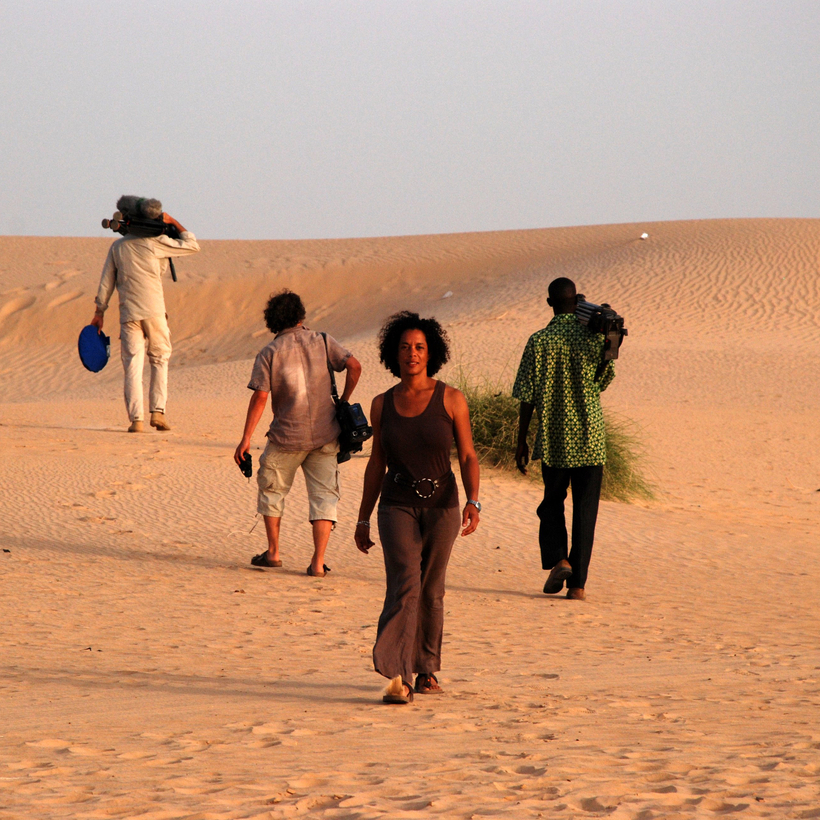Aminatta Forna is the rare writer who qualifies her love of flying with the caveat “I’m talking about being a passenger on a commercial flight.” Years ago, she had once steered a small aircraft with a friend, trying to pull off a stunt over eastern England. The first two times she struggled to rotate the plane, but during the third attempt she “flew out of the loop, my wings level, feeling like the gymnast who has … scored a perfect ten.”
Flying has other implications for Forna, because of her family history. Her father was a political dissident in Sierra Leone, jailed and executed when Forna was barely 10 years old. Her Scottish mother was forced into exile with the children, and they lived for years in Nigeria, Zambia, and Iran. Often on an international flight, the adult Forna will realize that she might be cruising over a war zone, that a person down there glancing up at her plane might be feeling a lack utterly alien to her fellow passengers. Her memories of trips are rife with similar episodes of disenchantment. Air travel is fraught with the turbulence of escape.

Forna hones this double vision in her first book of essays, The Window Seat. She brings to these pieces an itinerant sensibility from having known and seen many strange and familiar things. An ode to her father’s cohort of foreign-educated Africans deftly connects Barack Obama’s antecedents to her own. A meditation on the complicated afterlives of slavery is attuned to West Africa’s legacy of trading indentured men and women.
In Scotland, Forna digs up her mother’s Viking roots and finds that there isn’t much to tell apart “the stayers” from those who decide to leave. In Timbuktu, a city in Mali, Forna informs a passerby that many Westerners think of the place as a metaphor: for somewhere illusory, faraway, unreal. The man laughs on hearing this, as if she had just told him something unreal, and then “gave me directions to the post office.”
People and Places
This is a collection devoid of appraisals of other writers and artists; Forna is more interested in reading people and places. The longer essays are separated by terse encounters, a page or two long, from Forna’s stops around the globe. Even a worldly reader will be surprised by her facility for journeys. Wherever she ends up, she seems to have attachments, either ancestral or anecdotal.

In the Shetlands, we learn that she has “two per cent Norwegian blood”; in Tehran, we discover she lived there during the revolution; New Zealand is where her mother and stepfather chose to settle after retirement; Virginia is where Forna has set up base in recent years, after decades of living in London.
The wandering, for the most part, serves her well. Forna is at her best when she reclaims the triumphs of her parents’ generation: her father, deciding to return to a newly independent Sierra Leone after graduating from university in the U.K.; her mother, opting to move out of Scotland in the 1960s, declining “the script of a life with which she had been presented.”
But the question of what the subsequent generation—those who, like Forna and Obama, are now at home everywhere thanks to their parents’ choices—will leave behind is one that these essays would have been all the more complete for asking.
As you read about the idealism of midcentury African intellectuals and marvel at those who risked their lives during the American hostage crisis in Tehran, you can’t help but wonder about the legacy of their better-off children. Forna is certainly capable of switching up her point of view. I kept thinking of the person trapped in the middle of a war, looking up at a plane in the sky.
Abhrajyoti Chakraborty is a New Delhi–based writer

